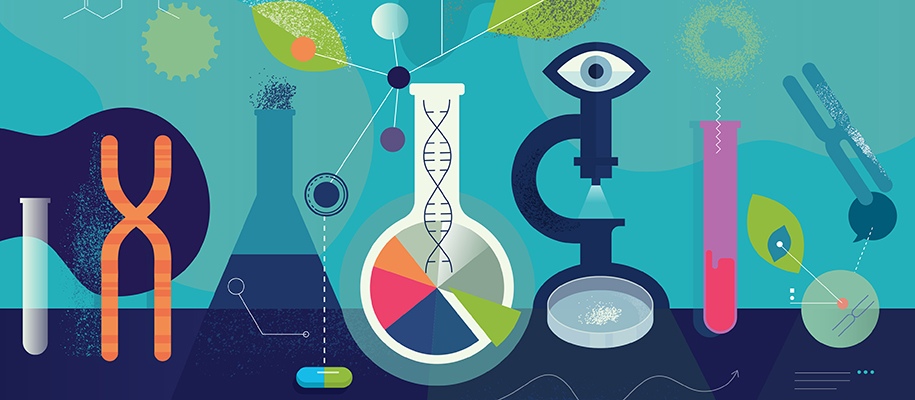Health Science programs prepare students to work in a variety of health-related jobs and careers. Students in these majors typically value the quality of health care, disease prevention, and health promotion to improve the lives of their future communities. However, the process of becoming a health care provider with this foundation can be quite challenging. Studying any subject can be hard, but it’s important to stay motivated and positive while you’re learning. Although you may find studying the Health Sciences to be challenging and tedious at times, there are many ways to make it more interesting. Here are just a few.
Read your notes out loud
To make studying Health Science more fun and effective, I like to read my notes out loud. Many science classes require a good amount of reading every week. With this workload, it gets hard to stay focused and interested in the content. The act of saying words out loud increases my ability to make sense of the content and remember it. A study done by Noah D. Forrin and Colin M. MacLeod shows the memory advantage of hearing your own voice in your head. The 95 students in the subject group were given the option of reading aloud, reading quietly, listening to recordings of others, or listening to a recording of themselves. Reading aloud had the greatest influence on memory recall, indicating that the words' impact stemmed from both hearing and saying them. This is due to a phenomenon known as the “production effect,” which happens when a word said aloud produces a memorable experience. Long-term memory is further aided by the cognitive process of encoding words into voice. Additionally, recall was higher among pupils with recordings of their own voices. This shows that hearing your voice offers a distinct stimulation of self-recognition, triggering a stronger memory.
Find a tutor and connect with professors
One of the greatest resources Health Science majors have access to but don’t often turn to are tutors. It’s obvious that students who have trouble understanding coursework should seek help from others who are experienced in it, but tutoring is usually the least used tool. Studying with another person is always going to be more fun than studying alone, so don’t overlook the values of a tutor beyond the academic help. There are many other resources designed to assist you in your studies and help you reach your full potential. One such resource many schools offer is a platform called “Ask A Professor,” which helps facilitate an easy way for students to ask their professors important questions and communicate their thoughts clearly and concisely. In addition, sending an email provides a record of communication, and professors can reply at their convenience. As a bonus, developing good digital communication skills will serve you well in school and your professional career.
Related: Video: Taking Advantage of Your Professors' Office Hours
Romanticize and idealize your studies
It’s no secret that studying can be difficult and boring. Whether it involves reading several chapters, taking notes, or answering questions, the process is tedious. So romanticize it! By idealizing your studying, it’ll be easier to find motivation to keep studying, resulting in better grades and test scores. To start, the design of your study space will significantly impact your mood, whether it be a chair in the corner of your room or a certain desk arrangement. Your study environment should reflect a positive mood to create a positive association with studying! Keep fragrant items nearby to heighten that cozy sensation. Rosemary and Eucalyptus are my personal favorites, and they’re known to have positive effects on brain function. There are also several playlists on Spotify and YouTube that can aid focus. Your choice of music depends on the mood you want to create. For instance, I find the Harry Potter theme music and lo-fi help me write much more effectively. I concentrate on the work at hand and the background music while the world around me becomes hazy. On YouTube, there are also a ton of "learn with me" live videos that last anywhere from 30 minutes to 10 hours. These enable you to have a virtual study companion to help you stay motivated and focused while doing your own assignments.
Bonus tip: Take breaks!
Keep in mind, if you’re invested in the Health Sciences, studying should be somewhat enjoyable. These recommendations combined with efficient study techniques might be helpful, but don’t put too much pressure on yourself to complete all your tasks at once. While being rigorous with your schedule is a good thing, taking breaks is crucial. Breaks let your mind rest and process the information passively. The effective pauses in productivity allow you the mental room to unwind rather than overstimulate yourself. Go for a little stroll to clear your head or do some meditation to calm your anxious thoughts. It’s recommended to take breaks that are spread out evenly throughout your study period. Try taking a five-minute break after 30 uninterrupted minutes of work, or take a 20-minute break after working for an hour without interruption.
Related: 4 Interesting Podcasts to Listen to on Your Study Breaks
The sheer quantity of material you must recall for Health Sciences courses may make studying seem daunting, but that doesn't mean it has to be miserable. If you want to make studying more enjoyable, these techniques can assist in making this a reality. You have a lot of flexibility as a student, especially in college, to choose how and when you study. To make it more fun, try planning your time in a way that’s most suited and effective for your chosen study techniques.
For more ways to ramp up your academic prowess, check out Our Best Advice for Homework, Studying, and Tests.






